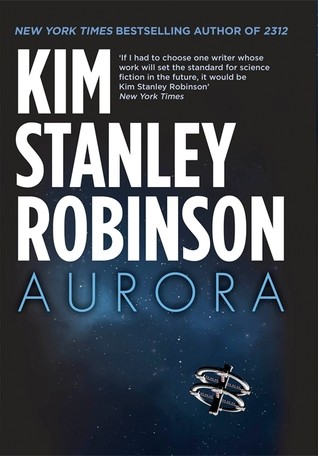nylki reviewed Aurora by Kim Stanley Robinson
Review of 'Aurora' on 'Goodreads'
5 stars
Ranges in the 4-5 stars range for me. Looking back, after finishing the last chapter, this feels a bit like the generation ship novel I always wanted to read, but didn't know existed or what title to look out for.
Its story is spanning decades, the ship has huge biomes where people actually lived multiple generations and create their own society and culture with all its issues due to being confined in a limited space (and gene pool), without a way to just move somewhere else or choose a different path as you could on earth.
The narrator perspective was something I liked about this book as well. The printed story in Aurora, which is essentially about the inhabitants/settlers of the generation ship, starts as a dialog between one of the ships engineers and the ships kind-of-sentient AI. Later this perspective changes again a bit, but that is spoiler territory.
…
Ranges in the 4-5 stars range for me. Looking back, after finishing the last chapter, this feels a bit like the generation ship novel I always wanted to read, but didn't know existed or what title to look out for.
Its story is spanning decades, the ship has huge biomes where people actually lived multiple generations and create their own society and culture with all its issues due to being confined in a limited space (and gene pool), without a way to just move somewhere else or choose a different path as you could on earth.
The narrator perspective was something I liked about this book as well. The printed story in Aurora, which is essentially about the inhabitants/settlers of the generation ship, starts as a dialog between one of the ships engineers and the ships kind-of-sentient AI. Later this perspective changes again a bit, but that is spoiler territory.
The world building is great and believable. If something did dissapoint me, it was to some degree the characters and their story, they didn't feel as deep as i would have liked. It all fits well together though and the ship-as-narrator itself is in a way the main character of the book and guiding the narration of the story and how everything was described including interpersonal relationships but also technical or engineering aspects of the travel. Those were sometimes very detailed, fitting the sentient AI-trope even ChatGPT-like escalatingly over detailed but also philosophical. And I suppose you can rarely have all of it in one book, intricate world building as well as deep characters and dialogs.
The storytelling is therefore quite different from a very dialog and conversational heavy book like Becky Chambers [b:Record of a Spaceborn Few|32802595|Record of a Spaceborn Few (Wayfarers, #3)|Becky Chambers|https://i.gr-assets.com/images/S/compressed.photo.goodreads.com/books/1516965190l/32802595.SY75.jpg|53399142] for example.
But overall great hard-SF read with some interesting story turns!
PS: On the topic of generation ships, one that I found equally intruiging and hitting similar points in terms of societal issues (as far as I remember from when I read) is Le Guin's novella [b:Paradises Lost|32797521|Paradises Lost|Ursula K. Le Guin|https://s.gr-assets.com/assets/nophoto/book/50x75-a91bf249278a81aabab721ef782c4a74.png|24874466], which is shorter of course but also highly recommended if you are interested in generation ship stories.



